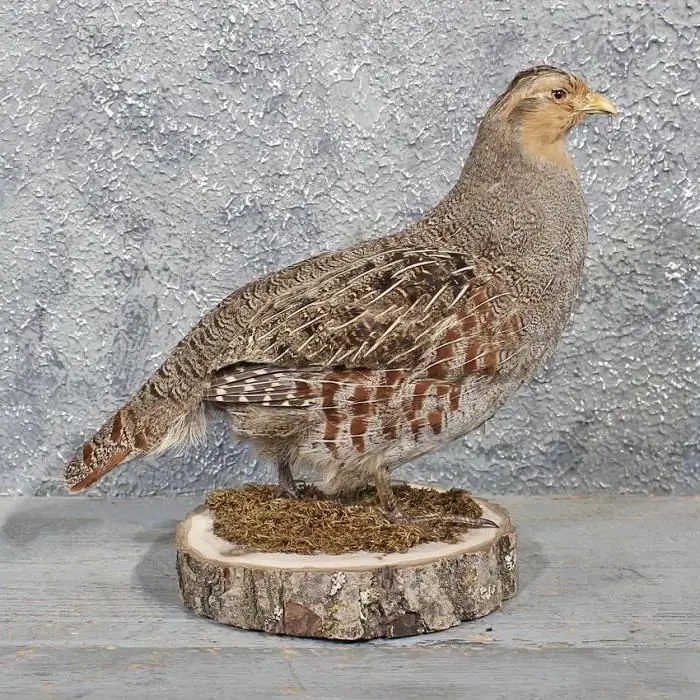2026 Author: Howard Calhoun | calhoun@techconfronts.com. Last modified: 2025-01-24 13:10:37
Cultivation of partridges at home as a business is a wonderful idea, especially interesting for business start-ups living in rural areas and without start-up capital and other earning opportunities. Why?

Business for beginners
Partridge farming is an exciting activity in itself, but it also brings profit. Why are partridges interesting in this regard? Breeding and keeping this bird at home has not yet become widespread, but there is a demand for it. This means that competition will be low, and there will be no problems with sales. This is the first advantage. The following follows from it - prices for poultry and meat cannot be low,This means that the income is secured. The third advantage is low costs and no initial investment, which is very important in a nascent business. And since expenses are low and incomes are high, then profits … That's right - big, but not immediately.
More about the gray partridge
The gray partridge is a sedentary bird common in the wild. In Russia, it lives in Altai, the Urals, the Caucasus, western Siberia, Karelia, the steppe and forest-steppe zone of the center and west of the country.
This is a small bird with a body length of about 30 cm, rounded shape. Variegated coloration is visible only up close and helps the bird to be invisible against the background of vegetation and the ground.

The partridge lives in open areas, in the field or steppe, nests on the ground, in well-protected places. Females cluck almost like chickens, males make a cock-like call.
By winter, partridges move closer to people and often spend the night in outbuildings.
Partridges can move fast enough even in dense grass and, if necessary, fly high with noise and screams.
They live in flocks of several dozen birds, but disperse in pairs during the mating season and live as a family, raising chicks on an equal footing, until the cold weather.
Partridge lays an average of 25 eggs per season.
The enemies of partridges in nature are birds of prey, animals, harsh winters and, of course, hunters.
These birds are so similar to ordinary chickens that it becomes unclear what problems breeding and keeping partridges inat home.
Partridge Room
Partridges don't need a big barn and a purpose-built building. The main thing is that it is dry, warm and without drafts. Since the partridge is a wild bird, it needs an aviary with a high fence for walking. In the walking area, tall grass and thorny bushes of blackthorn or wild rose must necessarily grow, which in their natural habitat are preferred by partridges for protection. Breeding and keeping at home a wild small bird is not so difficult. Tall grass, thorny bushes, warm straw bedding-nothing out of the ordinary or expensive.

Partridge is still not a chicken, it flies high enough, so many farmers install cages with a roof in a fenced enclosure. True, many experts agree that in an open area the bird grows better and gains weight. Partridges spend the night in a barn, the floor in which must be covered with straw or hay, changing the bedding every other day. Dry grass protects partridges from low temperatures. Therefore, it is necessary to stock up on it in the summer so that it lasts until next summer.

Partridges are afraid of drafts, all cracks must be carefully sealed in the house. They also do not tolerate loud sounds, so the walls of the barn from the inside can be sheathed with soundproofing material, which at the same time will warm it a little.
In one cage measuring 35 × 25 × 20 cm, you can keep three pairs of partridges. In the poultry houseartificial light is enough, but it must be mandatory.
Food
Partridges are not capricious and do not get sick. Therefore, there are no problems with nutrition. In nature, the bird feeds on grass, various bugs and their larvae. Partridges, whose breeding and keeping at home are not yet so widespread that a special compound feed has been developed for them, is happy to eat chicken or turkey compound feed, any grain or cereal.
They need calcium gluconate in sufficient quantities, so there should always be chalk or crushed shells near the feeder. When feeding a bird with roughage, it needs coarse sand to improve digestion. The water in the drinker must be clean and fresh.
Partridge breeding at home
Advice from experts and farmers begins with the purchase of several pairs of partridges. But in principle, one opposite-sex couple is enough to start. And fewer cages are needed, and males do not fight, and the costs are lower. And it's not so offensive if the experiment turns out to be unsuccessful.
There are three ways to acquire birds. The most expensive, but also the easiest way is to buy partridges from a specialized farm. There you can also get professional advice, which will require breeding and keeping partridges at home. The cheapest, but not always feasible way is to catch wild partridges in the field. The most time-consuming, but requiring special equipment and quite long, is to hatch the chicks from the eggs in the incubator.

Partridge chick rearing
Breeding and keeping partridges at home is not as complicated and time-consuming as it seems. Raising the young will require attention, but it is no different from raising the chicks of any other poultry.
Partridges start laying eggs at the end of April, this period lasts twenty-six days. All this time, the male must be in the same cage with the female in order to fertilize the eggs. Males and females are seated in different cages around the middle of summer.

During the season, one partridge produces about sixty eggs, and only fifteen are capable of hatching in one clutch. Surplus eggs can be either sold or used in the incubator.
In the first days, hatched chicks should be with their mother, they should be placed in a separate cage in about a week. For a walk, they begin to release them at the age of one month. Fresh air and warm sun, dry land overgrown with grass are the main conditions for the rapid growth and normal development of partridge chicks.
Breeding and keeping young animals at home does not require special knowledge on feeding them. In the first days, he is fed with mashed yolks of hard-boiled eggs and finely chopped greens of dandelions and yarrow, which grow almost everywhere at this time. Already on the third day, you can give crumbs of white bread, after five days - boiled meat or ant eggs, twice a day, gradually increasing the amount of food.
Benefits of partridge farming
So, going back to the beginning, now we can answer the question why breeding partridges at home is beneficial. Business ideas in rural areas and suburban towns are not so diverse. This is mainly the breeding and sale of domestic animals and poultry.
Partridges have some advantages in this regard. On the market today, the meat of this bird is represented in insufficient quantities, but there is a demand for it. All more or less expensive restaurants have rare poultry dishes on their menus and are ready to purchase them from trusted suppliers. Yes, and on your own table, this dietary, environmentally friendly meat without additives is a big plus.
![partridge breeding at home as a business [1] partridge breeding at home as a business [1]](https://i.techconfronts.com/images/041/image-120406-7-j.webp)
Partridge eggs have a unique chemical composition, they are rich in vitamins, and in cooking they can completely replace chicken eggs. There is only one requirement - they must be heat treated, fried, baked or boiled. They are also in demand in cosmetology.
The birds are unpretentious in keeping, they do not require special care, they get sick very rarely. Features of breeding partridges at home are not so complicated and impossible, even a novice farmer who has a private house and outbuildings can handle breeding.
True, there is still a difficulty, but not with breeding itself, but with the tax office. Business must be registered in the direction of activity "Farming poultry".
Of course, you should not expect profit from the first year, but alreadythe second year may bring some income. In addition, word of mouth is triggered, which greatly facilitates the sale of partridges, their eggs and meat.
Recommended:
Keeping broilers in cages at home: conditions of keeping, feeding and care rules

Broilers are chickens that are obtained by crossing meat productive breeds. They are grown exclusively for the purpose of later putting them on meat. The content of broilers in cages at home differs mainly in enhanced feeding. At the same time, physical activity is limited, due to which the weight indicator is growing rapidly. Usually such breeds are kept in specially equipped cages
Ostrich breeding at home. Business plan for breeding ostriches

Ostrich breeding is quite profitable and not too troublesome business. The unpretentiousness of birds in care and the high cost of ostrich products are exactly the factors that can push the farmer to a new occupation for himself - breeding ostriches at home. How to start breeding ostriches? What needs to be done first? How much will it cost?
Chinchilla breeding as a business: growing, keeping, breeding at home

Our planet has long been inhabited by thousands of species of living beings and plants, many of which are still not studied or poorly studied. Species that have gained particular popularity among humans are listed in the Red Book
Sheep breeding: business plan. Sheep breeding as a business from "A" to "Z"

It is not uncommon for start-up entrepreneurs living in rural areas, when choosing the direction of their activity, prefer to engage in sheep breeding. Raising sheep is traditionally a popular business
Rabbits: breeding and keeping at home, feeding rules and care features

In our article you will learn how to properly raise rabbits of famous breeds at home. You will also find many features for caring for them, the implementation of which will lead to the maximum productivity of the animal

